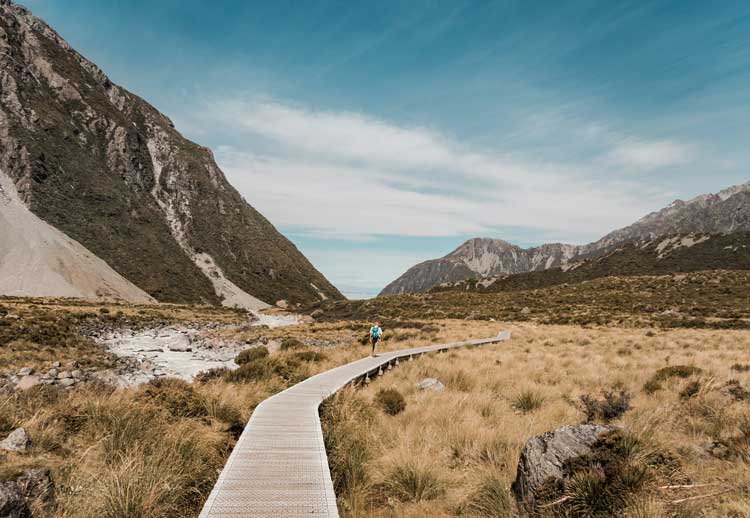
New Zealand is famous for its incredible landscapes ranging from glaciers to hot springs, volcanoes, and beautiful beaches. Nevertheless, due to its location, the island country is also sometimes affected by natural disasters, such as earthquakes, volcanic eruptions, and landslides.
Planning ahead is advisable: staying up to date with the news and learning about safety advice for New Zealand is just as important as booking the flights prior to departure and checking to see if a visa is needed.
Read expert travel recommendations to know what to do and enjoy a smooth trip to NZ.
Most common natural disasters in New Zealand
New Zealand is generally prepared for all of the following phenomena. Authorities, hotel personnel, and tour operators are aware of what procedures to take in the event of an emergency. Buildings are well-equipped and emergency protocols are in place.
Nevertheless, it is good practice to be prepared in case a weather-related event occurs while you are visiting New Zealand.
 What to do in the event of an earthquake in New Zealand
What to do in the event of an earthquake in New Zealand
Most of the earthquakes that occur in New Zealand are not even noticed by humans because they are very small, or very deep within the earth.
However, since bigger ones are still possible, it is advisable to know what to do in case there is an earthquake while vacationing in NZ:
- Drop down on your hands and knees
- Stay away from windows, chimneys, and shelves containing heavy objects
- Seek cover from objects that may fall by crawling under a sturdy table or desk
- Hold on to a shelter or to your head and neck until the shaking stops
- Stay indoors until the shaking is over
Tsunami safety advice for NZ
New Zealand is sometimes affected by very large waves. Precautions should be taken if visiting a coastal area while there is an earthquake that shakes for more than 1 minute or that makes it hard to stand up.
Here is what to do in case there is a tsunami while in NZ:
- Move to high ground or as far inland as possible
- Walk, bike, or run if possible
- Avoid driving or, if unavoidable, keep on driving until far from the coastal area in order not to cause unnecessary traffic
- Do not wait for a tsunami warning — if strange noises appear to be coming from the sea, move away
- Stay away from coastal areas until the all-clear
What to do in case of flooding in New Zealand
Floods may happen in NZ when there is continuous heavy rain or thunderstorms, or as a result of a tsunami or coastal storm.
Knowing what to do before, during, and after a flood is an excellent safety measure:
- Be prepared to evacuate quickly if it becomes necessary
- Lift valuable household items and chemicals as high above the floor as possible
- Fill bathtub, sink, and storage containers with clean water in case tap water becomes contaminated
- Turn off utilities if told to do so by authorities to prevent damage to the facilities
- Unplug small devices to avoid damage from power surges
- Avoid driving or walking through floodwaters unless it is absolutely essential
Volcano eruptions safety precautions
Most volcanoes have short active periods, separated by longer dormant periods.
Nevertheless, in the event that a volcano is threatening to erupt, keep in mind the following safety precautions:
- Stay indoors as volcanic ash is a health hazard, especially for people with asthma or bronchitis
- If outdoors:
- Seek shelter in a car or a building
- Wear a mask or handkerchief to protect the nose and mouth
- Wear goggles, sunglasses, or eyeglasses and avoid contact lenses
- Cover up as much skin as possible
- Protect sensitive electronics and do not uncover until the environment is totally ash-free
- Close windows and doors to limit the entry of volcanic ash; place damp towels at thresholds
New Zealand safety advice
Keep the following recommendations in mind when traveling abroad:
- Monitor the media and other sources for changes to local conditions
- Follow the advice of local authorities
- Make sure to have vaccinations that are up to date: A measles outbreak occurred in August 2019 in Auckland, New Zealand
- Get the right travel insurance
- Secure your passport in a safe, waterproof location or carry it
- Contact friends and family, or your country’s embassy so they know if you need help
The emergency phone number in New Zealand is 111
What to do in case of natural disaster in New Zealand
If traveling to New Zealand, keep in mind the following ways to stay safe in case a natural disaster occurs:
- Listen to local radio stations as emergency management officials will be broadcasting recommended advice
- Avoid unnecessary phone calls — do not tie up phone lines with non-emergency calls
- Stay away from coasts and riverbanks
- Evacuate to higher grounds following the hotel evacuation plan or local authority instructions
- Get familiar with the hotel you’re in — know where the nearest exits, first-aid kits, torches, and water are. Stay away from breakable, chemical, and flammable items
- Avoid using the elevator and choose the stairs instead
- Palawan Perfection: Exploring the Philippines’ Last Ecological Frontier - July 13, 2025
- A Journey to Ashland, Oregon’s Shakespeare Festival - July 13, 2025
- The Ultimate Guide to Cairo’s Top Three Museums: Which Should You Visit? - July 12, 2025

 What to do in the event of an earthquake in New Zealand
What to do in the event of an earthquake in New Zealand